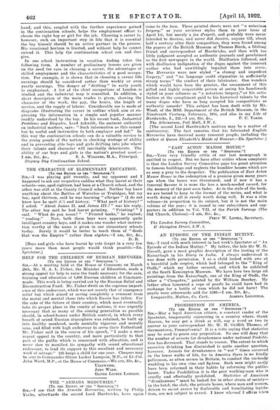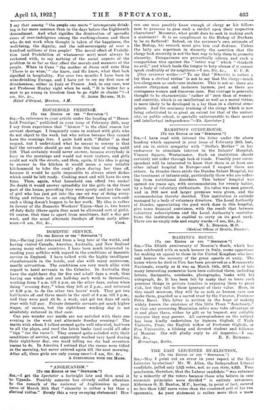PROHIBITION IN AMERICA.
(To THE EDITOR OP THE " SPECTATOR."1 SIR,—May a loyal American citizen, a constant reader of the Spectator, temporarily sojourning in a country where, thank Heaven, he may get a drink at will, say a ward or two in answer to your correspondent Mr. W. H. Griffith Thomas, of Germantown, Pennsylvania? It is a trite saying that statistics may be used to prove any proposition. No one will deny that the number of arrests for drunkenness under national Prohibi- tion has decreased. That stands to reason. The extent to which excessive drinking has diminished is quite another question, however. Arrests for drunkenness in " wet " times occurred in the lower walks of life, for in America there is no kindly policeman, as often occurs in Britain, to conduct the unsteady weakling to his own vine and fig-tree. Such men might easily have been reformed in their habits by reforming the public- house. Under Prohibition it is the poor working-man who is cruelly and effectually prohibited. Statistics of American "drunkenness" must be looked for in other strata of society— in the hotel, the club, the private house, where men and women, driven to secret excess by deplorable and humiliating legisla- tion, are not subject to arrest. I know whereof I affirm when
I say that among " the people one meets " intemperate drink- ing is far more common than in the days before the Eighteenth 'Amendment. And what signifies the diminution of sporadic cases of over-indulgence among the working-classes and those who do not work when thought is taken of the happiness, the well-being, the dignity, and the self-sovereignty !of over a hundred -millions of free people? The moral effect of Prohibi- tion (and Prohibition of whatsoever sort) must always be reckoned with, to say- nothing of the social aspects of the problem in so far as they affect the morals and manners of the people. When in Cana " the mother of Jesus said unto Him ` There is no wine,'" she knew, and He knew, what that lack signified in hospitality. For over two months I have been in wine-drinking Europe, and I have yet to see my first case of drunkenness, either in Italy or France. And, in any case, was not Professor Huxley right when he said, " It is better for a man to go wrong in freedom than to go right in chains "F—I
am, Sir, &c., G. ALDER BUCHER, M.D. Hold d'Orient, Menton, A.M.



































 Previous page
Previous page